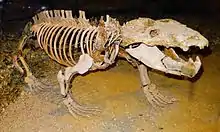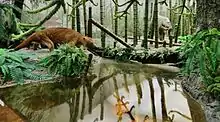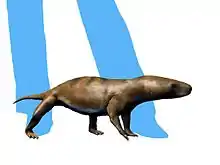Chiniquodon
Chiniquodon is an extinct genus of carnivorous cynodonts, which lived during the Late Triassic (Carnian) in South America (Argentina and Brazil) and Africa (Namibia and Madagascar). Chiniquodon is closely related to a contemporary genus, Probelesodon, and close to the ancestry of mammals.
| Chiniquodon | |
|---|---|
 | |
| Fossil of C. theotonicus in the Museum of Paleontology, Tuebingen | |
| Scientific classification | |
| Kingdom: | Animalia |
| Phylum: | Chordata |
| Clade: | Therapsida |
| Clade: | Cynodontia |
| Family: | †Chiniquodontidae |
| Genus: | †Chiniquodon von Huene 1936 |
| Type species | |
| †Chiniquodon theotonicus | |
| Species | |
| |
| Synonyms | |
| |
Other contemporaries included early dinosaurs. As both groups filled a similar ecological niche, fairly large therapsid hunters such as Chiniquodon may have been outcompeted by dinosaurs.
Classification


Chiniquodon brasilensis is from the Paleontological Site Chiniquá, Santa Maria Formation, Paraná Basin, Brazil. It is estimated to have been a dog-sized predator, with a skull-length of about 10 centimetres (0.33 ft). This species may not have been formally published.
Chiniquodon sanjuanensis[1] is from the Cancha de Bochas Member of the Ischigualasto Formation, Ischigualasto-Villa Unión Basin, northwestern Argentina. This skull was reassigned to this genus in 2002.[2] It's differentiated from Chiniquodon theotonicus because of its teeth and the shape of the zygomatic process.
Chiniquodon theotonicus is from the Santa Maria Formation, Brazil and Chañares Formation, Ischigualasto-Villa Unión Basin, northwestern Argentina. This species is known from a number of skulls. The holotype is in the paleontological collection at Tübingen University, Germany.
Chiniquodon kalanoro[3] is from the Isalo II Formation, Madagascar. This species is known from a mandible (holotype UA 10607).
References
- Ricardo N. Martinez & Catherine A. Forster (June 1996). "The skull of Probelesodon sanjuanensis, sp. nov., from the Late Triassic Ischigualasto Formation of Argentina". Journal of Vertebrate Paleontology. 16 (2): 285–291. doi:10.1080/02724634.1996.10011315.
- Abdala, F.; Giannini, N. P. (2002). "Chiniquodontid cynodonts: systematic and morphometric considerations". Palaeontology. 45 (6): 1151–1170. doi:10.1111/1475-4983.00280.
- Christian F. Kammerer; John J. Flynn; Lovasoa Ranivoharimanana; André R. Wyss (2010). "The first record of a probainognathian (Cynodontia: Chiniquodontidae) from the Triassic of Madagascar". Journal of Vertebrate Paleontology. 30 (6): 1889–1894. doi:10.1080/02724634.2010.520784.
Further reading
- Von Huene. Die Fossilien Reptilien des südamerikanischen Gondwanalandes an der Zeitenwende (Denwa-Molteno-Unterkeuper = Ober-Karnisch). Ergebnisse der Sauriergrabungen in Südbrasilien 1928/29. (The fossil reptiles of South American Gondwana during the temporal transition) (Denwa-Molteno-Upper Triassic = Upper Carnian). Results of the excavations in South Brazil 1928/29, part II.) 1936. Pages 93–159.







